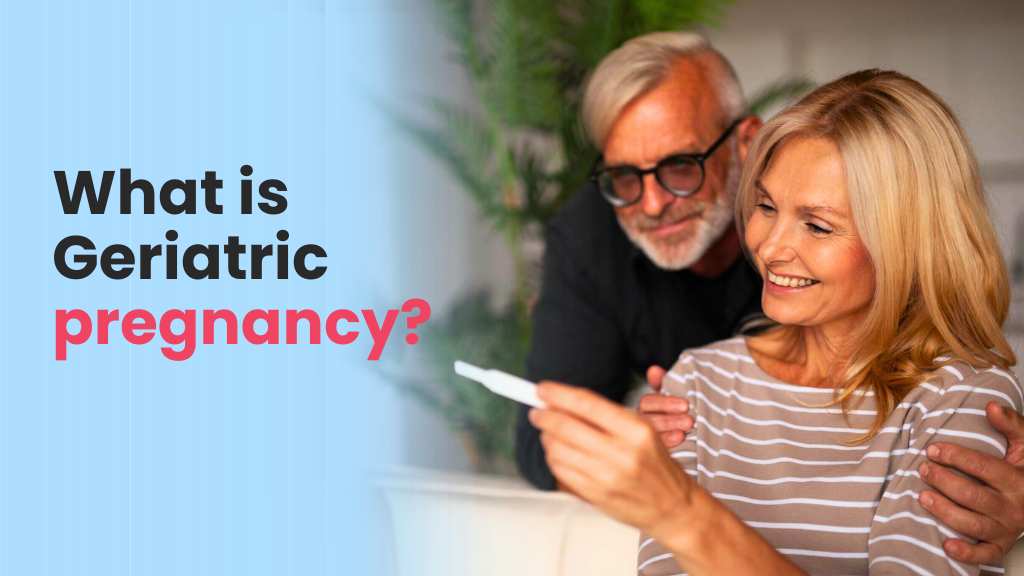
Table of Contents
Pregnancy is a remarkable journey, regardless of age. However, for women over 35, commonly referred to as “advanced maternal age,” the experience may come with unique considerations and concerns. In this article, we delve into the realities, risks, and rewards of pregnancy after 35, offering insights to empower expectant mothers on this transformative path.
What is a Geriatric Pregnancy?
Once stigmatized with terms like “geriatric pregnancy,” the narrative surrounding conception in one’s mid-late thirties and beyond has evolved. Modern healthcare now favors terms like “advanced maternal age” (AMA), acknowledging the nuances of pregnancy beyond traditional age thresholds. A woman turning 35 doesn’t abruptly transition into a high-risk category. Instead, the designation underscores a gradual increase in certain pregnancy-related risks, including hypertensive disorders, gestational diabetes, and chromosomal abnormalities.
Research on Geriatric Pregnancy
The researchers conducted extensive research on geriatric pregnancy, utilizing databases like Cinahl, PubMed, Medic, and the Cochrane Library to identify relevant articles published in English between 2000 and 2008. Their objective was to examine portrayals of pregnant women aged 35 and older and assess associated pregnancy risks. Findings indicated a link between advanced maternal age and specific pregnancy risks, causing anxiety in this demographic. These women often sought extensive information but were overwhelmed by its abundance. The study emphasizes the importance of healthcare providers understanding the unique needs of older pregnant women and providing personalized care to ensure their well-being.
Navigating Risks and Realities
It’s crucial to recognize that every pregnancy carries inherent risks, irrespective of age. For women over 35, however, the likelihood of certain complications may incrementally rise, especially in the presence of pre-existing health conditions. Hypertensive disorders, gestational diabetes, premature birth, and low birth weight are among the potential challenges expectant mothers may face. Additionally, the risk of chromosomal abnormalities, such as Down syndrome, may slightly elevate with maternal age.
Mitigating Risks Through Proactive Measures
While geriatric pregnancy age may influence pregnancy outcomes, proactive steps can significantly mitigate associated risks. Adopting a healthy lifestyle, characterized by regular exercise, balanced nutrition, and stress management, is paramount. Maintaining a healthy body composition and limiting alcohol intake when trying to conceive can optimize maternal health pre-pregnancy. Moreover, adherence to prenatal care guidelines, including regular check-ups and screenings, ensures timely detection and management of any emerging issues.
The Role of Support and Monitoring
Pregnant women over 35 may find themselves subject to increased monitoring and testing throughout their journey. From additional ultrasounds to screenings for heart conditions and gestational diabetes, the aim is to safeguard maternal and fetal well-being. While these interventions may add complexity to the pregnancy experience, they also offer invaluable insights and opportunities for proactive intervention. The support of healthcare professionals and a robust prenatal care regimen are indispensable allies on this path.
Overcoming Age-Related Concerns
Beyond the medical realm, pregnancy after 35 may evoke a myriad of emotional and psychological considerations. From concerns about energy levels and physical recovery to navigating societal perceptions, expectant mothers must prioritize self-care and self-compassion. Embracing the unique advantages of pregnancy later in life, such as financial stability, previous childbirth experience, and a broader support network, can foster a sense of empowerment and resilience.
Paternal Age and Pregnancy
While much attention is focused on maternal age, the impact of paternal age on pregnancy outcomes should not be overlooked. Advanced paternal age, typically defined as 40 years and older, may correlate with increased risks of miscarriage, neural-cognitive disorders, and preterm birth. However, unlike maternal age, no definitive screening tools exist to assess these risks conclusively. Nevertheless, open communication between partners and ongoing support from healthcare providers can help navigate any age-related concerns.
Embracing the Journey
Despite the nuances and complexities, pregnancy after 35 is a journey ripe with possibility and promise. Each milestone, from the first flutter of movement to the joyful anticipation of childbirth, holds the potential for profound transformation and growth. By prioritizing self-care, seeking support, and staying informed, expectant mothers can navigate this chapter with confidence and grace.
Concluding Thoughts - Geriatric Pregnancy
Pregnancy after 35 is not merely a medical designation but a testament to the resilience and vitality of the human spirit. While geriatric pregnancy age may introduce certain challenges, it also brings wisdom, perspective, and a deep appreciation for the miracle of life. By embracing the journey, advocating for their well-being, and nurturing a supportive community, expectant mothers can embark on this adventure with courage and conviction, paving the way for a vibrant and fulfilling chapter of motherhood.










